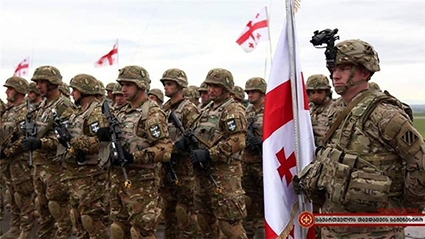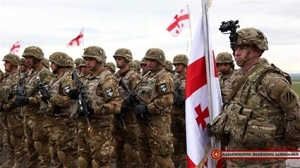Georgians in Afghanistan Defending their Country
Several days ago, Vasil Kulijanashvili, a Georgian soldier on an international mission in Afghanistan, was killed in the line of duty. He was part of the Resolute Support Mission from Georgia, the largest contributor to Afghanistan among all non-NATO member states.
Georgia’s Defense Ministry offered its condolences to Kulijanashvili’s family and the government and president expressed their sorrow over the incident, naming Kulijanashvili a hero. He was honored both by the state and the public in the lowering of national flags and an escort accompanying the fallen hero from Afghanistan to his motherland.
Georgian forces are participating in the Afghanistan Mission as part of a global anti-terrorist campaign. During the last couple of years, Georgia has lost around 30 patriots who were lead to believe they were defending Georgia’s sovereignty from overseas.
Why Georgia’s sovereignty?
Georgia’s post-Soviet independent life since 1991 turned out to be a continuous great sacrifice the territorially tiny nation made for her freedom. The country has experienced an array of painful moment, including the war in Abkhazia, Russian-provoked civil war and the August War in 2008, not to mention the on-going occupation of one-fifth of the country’s sovereign territory.
What was the core matter the country faced her existential threat for? Who were those who did not endeavor enough to help the newly freed country to survive? The answer is none. Georgia, during the last two centuries, lived a subordinated life under the Russian Empire, including the USSR, which cleaned the country from intellectual, patriot and ambitious society and created a conformist proletariat class in its stead.
Notwithstanding gaining independence at the end of the previous century, there were no state institutions functioning, no police to provide security, no economy to keep the country viable and no military to defend it from external threat. The country was in a hybrid state.
What happened?
From the beginning of the 21-st century, Georgia entered a new era. The country voted for real progress and prosperity as their European friends had long been enjoying. Since 2004, Georgia has been mentally ‘revolutionized,’ as the journal Economist would later call the process.
Along with the massive reforms throughout the public sector, one of the main priorities had been given to creating a new Georgian army that would be capable to deter even a Russian army at the great loss of a potential adversary. Georgia’s lucid aspiration towards the NATO alliance was initially demonstrated when the country, with its limited number of soldiers, joined the peacekeeping operations carried out by the Alliance on the ground of Kosovo in 1999.
Additionally, the significantly increased contingent of the already new Georgian armed forces joined NATO troops in Iraq and Afghanistan as they began modernizing and contributing to global security: the fight against international terrorism.
At present, for Georgia, standing alongside its international partners for international security and well-being, means that the country is, despite her occupied regions, economic hardships and daily threat from Russia, fighting with her historical friends- the Europeans -for mutual defense and security.
In 2008, in spite of many myths spread, the US stopped the Russian army entering the Georgian capital and toppling the legitimate government. This, unlike previous times as Georgia had already become part of European and American politics. The country was no longer alone to meet Russia’s military aggression. The second articulation of the fact were six European presidents arriving in the capital city of Tbilisi to support Georgia. The country had really made a difference.
Finally, Russian media sources in the country have long been disseminating propaganda making out Georgians are fighting and dying on foreign land for no reason. Quite the opposite, as Georgia, as a part of international society, is obliged to care for the security of others as other care for Georgia’s safety and prosperity.
Why are Georgians dying in foreign lands? Because they are defending their families, their country and the sovereignty of that country.
Zviad Adzinbaia












